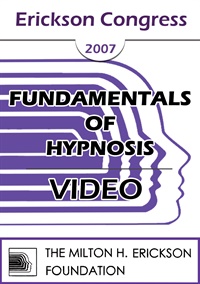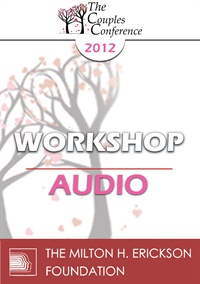
- Average Rating:
- Not yet rated
- Topic Areas:
- Couples Therapy | Workshops | Family Therapy | Blended Families
- Categories:
- Couples Conference | Couples Conference 2012 | Pioneers in Couples and Family Therapy
- Faculty:
- William Doherty, PhD
- Duration:
- 1:58:12
- Format:
- Audio Only
- Original Program Date:
- Apr 28, 2012
- Short Description:
- Remarried couples are often poorly served by therapists who treat them without enough appreciation for the unique complexity and multiple loyalties of stepfamily life. This workshop will combine clinical assessment and treatment issues with a special focus on values issues, such as commitment and fairness that often dominate conflict in stepfamilies.
- Price:
- $15.00 - Base Price
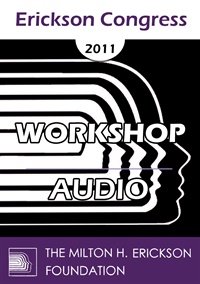
- Average Rating:
- Not yet rated
- Topic Areas:
- Workshops | Storytelling | Advanced Techniques of Hypnosis & Therapy
- Categories:
- Erickson Congress | Erickson Congress 2011
- Faculty:
- Sonja Benson, PhD | George Gafner, LCSW
- Duration:
- 59 Minutes
- Format:
- Audio Only
- Original Program Date:
- Dec 07, 2011
- Short Description:
- Stories can bypass resistance in ways direct advice never will. In this lively workshop, Benson and Gafner demonstrate confusional techniques, alternating stories, metaphorical ego strengthening, and subtle language shifts that engage the unconscious without confrontation. Through live exercises and clinical examples, participants learn how to interrupt patterns, build resilience, and craft their own therapeutic stories for complex and resistant clients.
- Price:
- $20.00 - Base Price
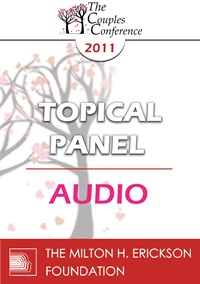
- Average Rating:
- Not yet rated
- Topic Areas:
- Divorce | Couples Therapy | Topical Panels | Assessment
- Categories:
- Couples Conference | Couples Conference 2011 | Pioneers in Couples and Family Therapy
- Faculty:
- Lilian Borges, MA, LPC | William Doherty, PhD | Julie Gottman, PhD
- Duration:
- 59:04
- Format:
- Audio Only
- Original Program Date:
- Apr 02, 2011
- Short Description:
- A panel discussion on effectively assessing when separation or divorce may be appropriate for couples. Experts share practical methods, including structured assessment sessions using conflict discussions and physiological responses, as well as discernment counseling to clarify couples’ decisions. They emphasize key factors such as trust, emotional intimacy, conflict management, and therapist neutrality. Real-world examples highlight handling severe issues like addiction and domestic violence, and maintaining hope while supporting clients' difficult decisions.
- Price:
- $15.00 - Base Price
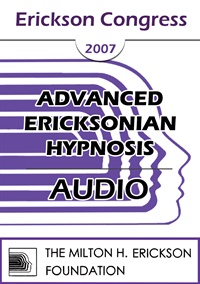
- Average Rating:
- Not yet rated
- Topic Areas:
- Workshops | Confusion Technique | Hypnosis | Indirection | Language of Hypnosis | Binds | Suggestion
- Categories:
- Erickson Congress | Erickson Congress 2007
- Faculty:
- Stephen Lankton, MSW
- Duration:
- 2:50:39
- Format:
- Audio Only
- Original Program Date:
- Dec 10, 2007
- Short Description:
- Participants will be guided through several exercises to help them learn and practice the construction of four forms of confusion technique, bring the number of indirect suggestion to six and the number of therapeutic binds to four. A demonstration using these forms will illustrate the implementations of this set of language techniques for the induction and treatment process.
- Price:
- $15.00 - Base Price
- Average Rating:
- Not yet rated
- Topic Areas:
- Fundamentals of Hypnosis | Hypnosis | Resources
- Categories:
- Erickson Congress | Erickson Congress 2007
- Faculty:
- Michael Yapko, PhD
- Course Levels:
- Master Degree or Higher in Health-Related Field
- Duration:
- 1:21:47
- Format:
- Audio and Video
- Original Program Date:
- Dec 07, 2007
- Short Description:
- This training introduces the fundamentals of hypnosis and the Ericksonian method of using trance to access personal resources. Participants learn how to guide clients in recalling positive experiences, amplifying useful strengths, and extending them into future situations. Through demonstration and practice, the workshop teaches practical techniques such as age regression, reframing, and post-hypnotic suggestion, offering a structured, empowering approach to facilitate insight, resilience, and change.
- Price:
-
Sale is $29.00
price reduced from Base Price - $59.00
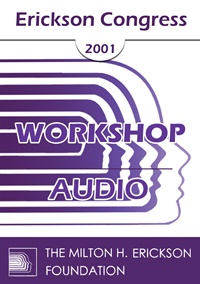
- Average Rating:
- Not yet rated
- Topic Areas:
- Workshops | Metaphors | Confusion Technique | Indirection | Binds | Suggestion
- Categories:
- Erickson Congress 2001 | Erickson Congress
- Faculty:
- Stephen Lankton, MSW
- Duration:
- 2:30:40
- Format:
- Audio Only
- Original Program Date:
- Dec 07, 2001
- Short Description:
- Participants will be guided through several exercises to help them learn and practice the construction of six forms of indirect suggestions, four therapeutic binds and four verbal confusion techniques. A demonstration using these forms will illustrate the implementation of this set of language techniques for the induction process and how they elaborate simple metaphor. Reasons for the use of indirect suggestions, binds and confusion in treatment and their effect will be addressed and demonstrated.
- Price:
- $15.00 - Base Price
Credit available - Click Here for more information
- Average Rating:
- Not yet rated
- Topic Areas:
- Hypnosis | Psychotherapy | Advanced Techniques of Hypnosis & Therapy | Continuing Education | Resistance | Ericksonian Hypnosis and Therapy Techniques | Milton Erickson | Confusion Technique | Naturalistic | Seeding | Hypnotherapy
- Categories:
- Advanced Techniques of Hypnosis & Therapy | Featured | Training Videos | Online Continuing Education | Milton H. Erickson Collections
- Faculty:
- Milton H. Erickson, MD | Jeffrey Zeig, PhD
- Course Levels:
- Master Degree or Higher in Health-Related Field
- Duration:
- 1 Hour 55 Min
- Format:
- Audio and Video
- Original Program Date:
- Dec 31, 1978
- Short Description:
- In 1979, Milton Erickson and Jeffrey Zeig spent five hours reviewing a demonstration that Erickson conducted at a teaching seminar. That demonstration is now available as a training video for Ericksonian practitioners. Erickson’s experiential methods include the symbolic use of hypnotic phenomena, encouraging resistance, naturalistic confusion technique, seeding, and using isomorphic anecdotes. Jeffrey Zeig discusses the mechanics of Erickson’s unique approach to psychotherapy. Working with Resistance provides an opportunity to watch a master hypnotherapist demonstrate his technique.
- Price:
- $75.00 - Base Price


